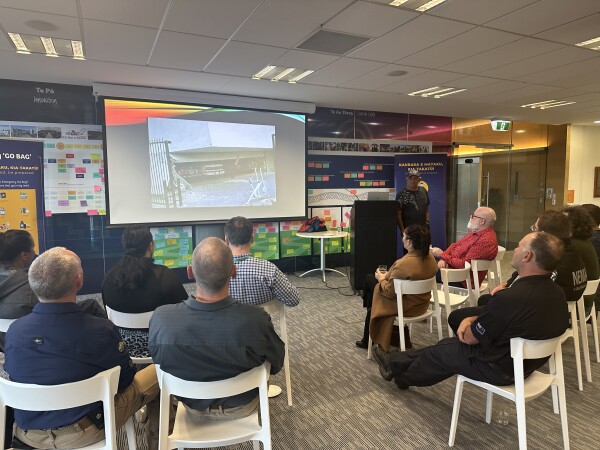Disaster preparedness expert shared insights on strengthening communities in the face of natural disasters
Oct 26, 2023

Kaimahi from the Whānau & Emergency Response Team joined representatives from Papatipu Rūnanga and agency partners to listen to Captain Ojeda’s presentation on preparing communities against natural disasters and emergencies.
Creating systems that work for the community was a key message from Captain Ojeda that Senior Advisor for Whānau & Emergency Response Keela Atkinson said she resonated with.
“Captain Ojeda encouraged us to develop our own systems with the community in mind. Some things just don’t fit in a book.”
“Having a plan A, B and even a plan C was also something that he highlighted.”
Captain Ojeda said that every member of the community has an important role to play in an emergency and response situation.
“Communities need a response team within them. Regular drills and designated roles are essential. It’s about being proactive and having a plan in place before disaster strikes,” he said to the attendees.
“Identify every skill and resource within the community. From medical training to ham radio operation and heavy equipment ownership, every asset counts in a disaster response plan.”
Practice, according to Captain Ojeda, is also key to effective disaster preparedness.
“Regular practice, tabletop exercises, and quarterly drilling are imperative,” he said.
These practices help identify weaknesses in the plan and allow communities to address issues before they become critical during an actual emergency.
He also highlighted the practical aspects of disaster preparedness, including the importance of having generators not only for powering essential equipment but also for refrigeration to keep food and medicines. He said that maintaining proper storage for medicines and critical emergency supplies is crucial for the wellbeing of the community.
Finally, he emphasised the role of communication in disaster management. He underscored the need for reliable communication systems.
“No communication means no situational awareness, and in an emergency, that could be a matter of life and death. Generators coupled with communication systems are the backbone of preparedness."
